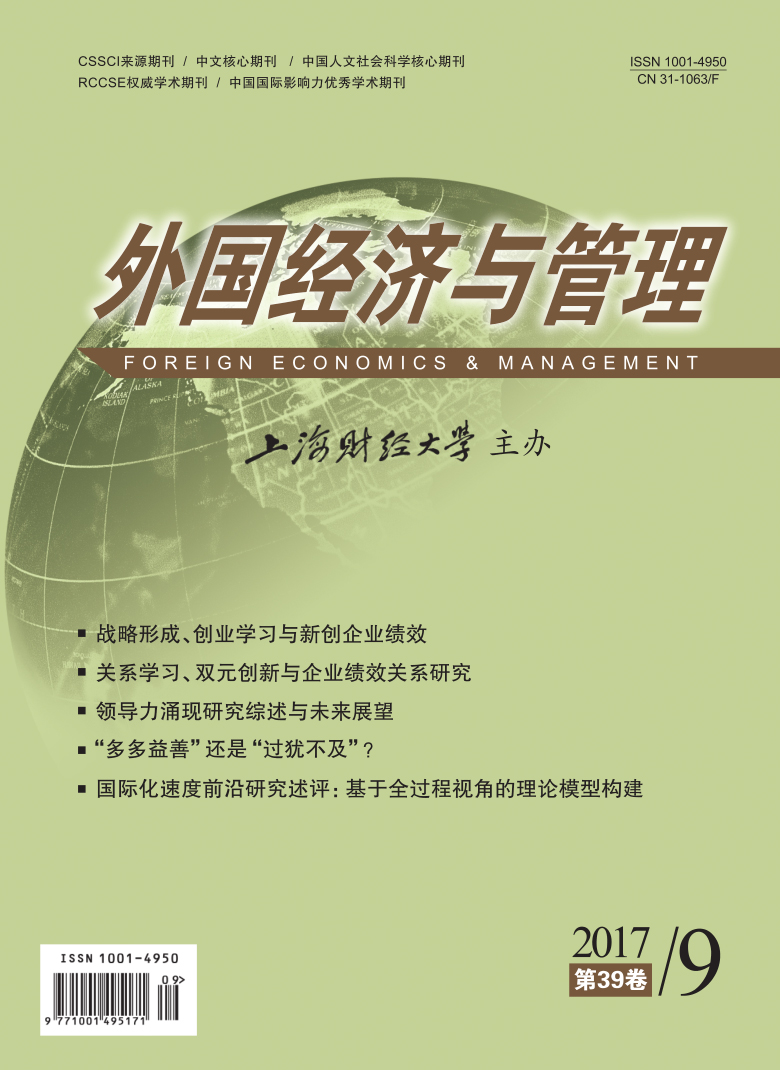近些年来,学者对企业绩效差异形成的原因探索已经从企业内部因素转移到企业外部的关系因素上来。本研究以组织间学习理论和双元理论为基础,使用254份高技术企业的研究样本,探究了关系学习对企业绩效的影响机制,尤其是探索了双元创新在关系学习和企业绩效之间的中介作用。实证研究结果表明,在不考虑其他因素的条件下,关系学习的三个子维度(信息共享、共同理解、特定关系记忆)对企业绩效具有显著的正向影响作用;在将双元创新纳入到研究模型之后,双元创新分别在信息共享以及特定关系记忆与企业绩效之间起到中介作用假设获得支持;但是双元创新对共同理解和企业绩效之间的中介作用假设没有获得支持,所以双元创新在关系学习和企业绩效之间起到部分中介作用。最后对本文的研究局限性进行讨论并对未来研究方向提出可行性建议。考虑双元创新这个重要因素可以更好的解析关系学习对企业绩效的影响机制,能够为转型经济背景下的企业开展关系学习活动和提升双元创新能力提供有益的参考。
关系学习、双元创新与企业绩效关系研究
摘要
参考文献
1 Blindenbach-Driessen F, Van Den Ende J. The locus of innovation: The effect of a separate innovation unit on exploration, exploitation, and ambidexterity in manufacturing and service firms[J]. Journal of Product Innovation Management, 2014, 31(5): 1089–1105. DOI:10.1111/jpim.12146
2 Chen Y S, Lin M J J, Chang C H. The positive effects of relationship learning and absorptive capacity on innovation performance and competitive advantage in industrial markets[J]. Industrial Marketing Management, 2009, 38(2): 152–158. DOI:10.1016/j.indmarman.2008.12.003
3 Cheung M S, Myers M B, Mentzer J T. Does relationship learning lead to relationship value? A cross-national supply chain investigation[J]. Journal of Operations Management, 2010, 28(6): 472–487. DOI:10.1016/j.jom.2010.01.003
4 Chong T Y, Oly N N. Evaluating supply chain relationship quality, organisational resources, technological innovation and enterprise performance in the palm oil processing sector in Asia[J]. Journal of Business & Industrial Marketing, 2014, 29(6): 487–498.
5 Cowana K, Paswan A K, Steenburgc E V. When inter-firm relationship benefits mitigate power asymmetry[J]. Industrial Marketing Management, 2015, 48: 140–148. DOI:10.1016/j.indmarman.2015.03.013
6 Fang S R, Fang S C, Chou C H, et al. Relationship learning and innovation: The role of relationship-specific memory[J]. Industrial Marketing Management, 2011, 40(5): 743–753. DOI:10.1016/j.indmarman.2011.02.005
7 Güttel W H, Konlechner S W, Trede J K. Standardized individuality versus individualized standardization: the role of the context in structurally ambidextrous organizations[J]. Review of Managerial Science, 2015, 9(2): 261–284. DOI:10.1007/s11846-014-0156-2
8 Jean R J B, Sinkovics R R, Kim D. Drivers and performance outcomes of relationship learning for suppliers in cross-border customer-supplier relationships: The role of communication culture[J]. Journal of International Marketing, 2010a, 18(1): 63–85. DOI:10.1509/jimk.18.1.63
9 Jean R J B, Sinkovics R R. Relationship learning and performance enhancement via advanced information technology: The case of Taiwanese dragon electronics firms[J]. International Marketing Review, 2010b, 27(2): 200–222. DOI:10.1108/02651331011037520
10 Kohtamäki M, Bourlakis M. Antecedents of relationship learning in supplier partnerships from the perspective of an industrial customer: the direct effects model[J]. Journal of Business & Industrial Marketing, 2012, 27(4): 299–310.
11 Kortmann S. The mediating role of strategic orientations on the relationship between ambidexterity-oriented decisions and innovative ambidexterity[J]. Journal of Product Innovation Management, 2015, 32(5): 666–684. DOI:10.1111/jpim.12151
12 Lai C S, Pai D C, Yang C F, et al. The effects of market orientation on relationship learning and relationship performance in industrial marketing: The dyadic perspectives[J]. Industrial Marketing Management, 2009, 38(2): 166–172. DOI:10.1016/j.indmarman.2008.12.004
13 Li C R, Lin C J, Huang H C. Top management team social capital, exploration-based innovation, and exploitation-based innovation in SMEs[J]. Technology Analysis & Strategic Management, 2014, 26(1): 69–85.
14 Lin C J, Chen C C. The responsive-integrative framework, outside-in and inside-out mechanisms and ambidextrous innovations[J]. International Journal of Technology Management, 2015, 67(2–4): 148–173.
15 Lin C, Chang C C. A patent-based study of the relationships among technological portfolio, ambidextrous innovation, and firm performance[J]. Technology Analysis & Strategic Management, 2015, 27(10): 1193–1211.
16 Lin H E, McDonough E F. Cognitive frames, learning mechanisms, and innovation ambidexterity[J]. Journal of Product Innovation Management, 2014, 31(S1): 170–188.
17 Liu C L E. An investigation of relationship learning in cross-border buyer-supplier relationships: The role of trust[J]. International Business Review, 2012, 21(3): 311–327. DOI:10.1016/j.ibusrev.2011.05.005
18 Nicholls A, Huybrechts B. Sustaining inter-organizational relationships across institutional logics and power asymmetries: The case of fair trade[J]. Journal of Business Ethics, 2016, 135(4): 699–714. DOI:10.1007/s10551-014-2495-y
19 Nyaga G N, Lynch D F, Marshall D. Eamonn Ambrose. Power Asymmetry, Adaptation and Collaboration in Dyadic Relationships Involving a Powerful Partner[J]. Journal of Supply Chain Management, 2013, 49(3): 42–65. DOI:10.1111/jscm.2013.49.issue-3
20 Rogan M, Mors M L. A network perspective on individual-level ambidexterity in organizations[J]. Organization Science, 2014, 25(6): 1860–1877. DOI:10.1287/orsc.2014.0901
21 Sok P, O’Cass A. Achieving service quality through service innovation exploration-exploitation: the critical role of employee empowerment and slack resources[J]. Journal of Services Marketing, 2015, 29(2): 137–149. DOI:10.1108/JSM-03-2014-0085
22 Wang C H, Hsu L C. Building exploration and exploitation in the high-tech industry: The role of relationship learning[J]. Technological Forecasting and Social Change, 2014, 81: 331–340. DOI:10.1016/j.techfore.2013.04.008
23 Wang C H. The moderating role of power asymmetry on the relationships between alliance and innovative performance in the high-tech industry[J]. Technological Forecasting and Social Change, 2011, 78(7): 1268–1279. DOI:10.1016/j.techfore.2011.03.017
24 Wu W Y, Lin C, Chen S H, et al. The mediating effect of relationship learning on the relationship between supplier development strategy and raising competence[J]. African Journal of Business Management, 2011, 5(13): 5136–5151.
25 Yang C F, Lai C S. Relationship learning from organizational knowledge stores[J]. Journal of Business Research, 2012, 65(3): 421–428. DOI:10.1016/j.jbusres.2011.10.001
引用本文
宋春华, 马鸿佳, 马楠. 关系学习、双元创新与企业绩效关系研究[J]. 外国经济与管理, 2017, 39(9): 32–46.
导出参考文献,格式为:






 10739
10739  15048
15048

